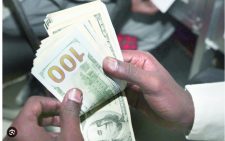Shilling tipped to decline further on debt servicing

The Kenya shilling has depreciated by a further 1.6 per cent against the US Dollar, closing at Sh132.6, and undoing recent gains over the past three months, with experts warning it could slide further, hurting the country’s fiscal space.
Investment experts at Cytonn attributed this decline to a persistent current account deficit, high government debt servicing, and dwindling foreign exchange reserves, which currently stand at $7.3 billion and below the statutory requirement of four months of import cover.
The depreciation was further compounded following rejection of the controversial Finance Bill 2024/25, as this made investors jittery over Kenya’s inability to meet its fiscal obligations. In June exchange rate experienced fluctuations during the period from June 18 to July 25. Initially, it stood at Sh128.8 when the protests began.
However, it weakened to Sh129.5 by June 27. Subsequently, the depreciation continued, reaching Sh130.5 on July 19 and further rising to 131.05 on July 24. Eventually, it settled at Sh132.2 on July 25.
Analysts at Cytonn warned that the depreciation will only aggravate the inflationary pressures, making imports more expensive and increasing the cost of living.
They project the year-on-year inflation rate for June 2024 to come in at the range of 4.7 per cent and 5 per cent mainly on the back of the weakening of the Kenya shilling against the US Dollar having recorded a 2.4 per cent month-to-date decline to Sh132.6 as of July 26, 2024 from the Sh129.5 recorded at the beginning of the month. “The contrast to the 0.5 per cent gain recorded last month and the 15.6 per cent year-to-date gain from the Sh157 recorded at the beginning of the year,” the investment advisors said.
Forex reserves
The analysts said the recent Gen Z protests had not only disrupted tourism and trade, but could lead to authorities tapping into its forex reserves to meet demand for the greenback, with additional challenges coming from the maturing debt and undersubscription of government papers by investors.
“We are seeing diaspora remittances coming down. If you look at the June numbers, they are significantly lower that what we saw in May,” Gichinga said. Rufus Kamau, a research and markets analysts at EGM securities said the rejection of the Finance Bill signifies a vote of no confidence in the shilling.
He said that the situation has altered the perspectives of many investors who had anticipated a recovery of the shilling against the greenback, noting that.
“We have seen investors undersubscribe to the Government Bond, because they are not confident the government will be able to pay when bonds mature. So, what we are seeing is an inversion of the bonds curve mainly because people are willing to lend to the government for the next 90 days and less willing to lend to the government for the next 20 years,” Kamau said.
This scenario is further complicated by the Central Bank of Kenya’s (CBK) tight monetary policy, maintaining a high benchmark interest rate of 13 per cent to combat inflation, which inadvertently crowds out private sector lending.










